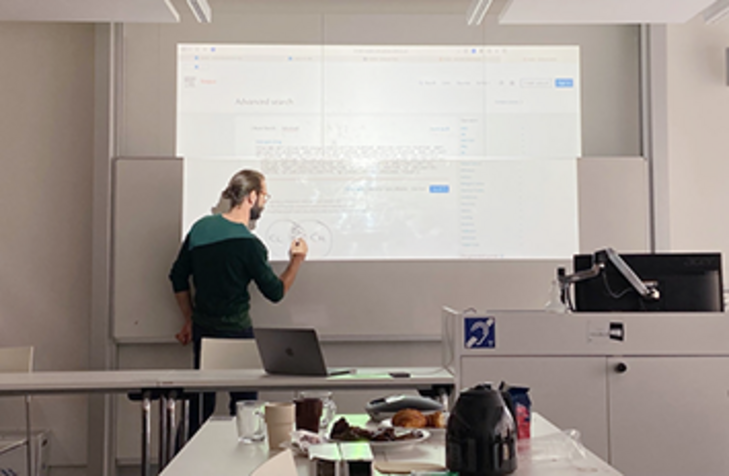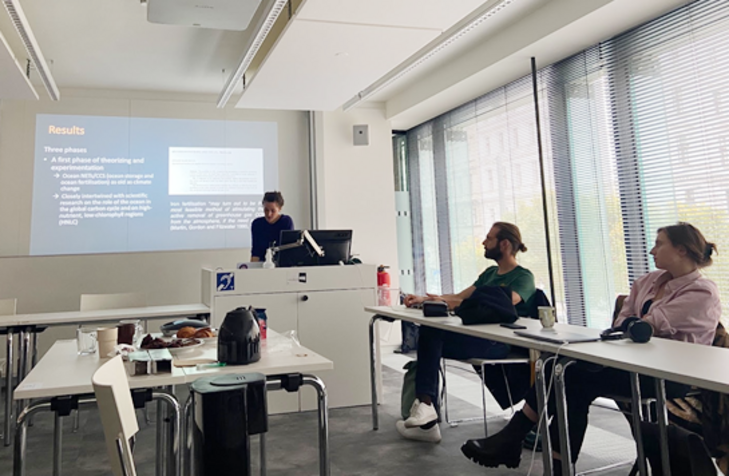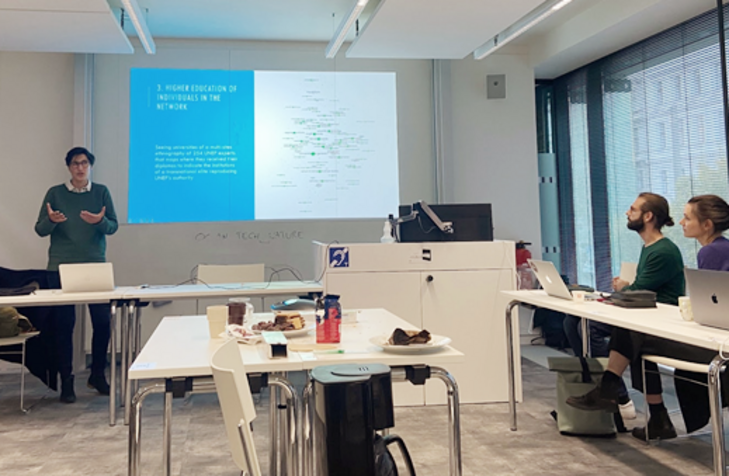The ViDSS Blog
Nothing if not critical: Exploring digital methods beyond qualitative and quantitative approaches
In November 2022, Pouya Sepehr and I organised a workshop with Tommaso Venturini and Kari de Pryck, two scholars recently academically settled at the University of Geneva. The workshop was kindly funded by the Vienna Doctoral School for Social Sciences and supported by Professor Sarah Davies from our home department of Science and Technology Studies. Under the title ‘Experimenting with Digital Methods for Qualitative Research’, the aim of this two-day intensive workshop was to introduce and engage doctoral students with various techniques for working with digital records that could be integrated in their current or future research. The workshop also catered to researchers who are mainly working with interviews, ethnographically, or who, broadly speaking, identify their research as “qualitative.”
We put quotation marks around the “qualitative” on purpose, as one of the goals of this workshop was to go beyond the convention of a binary split within social sciences between qualitative and quantitative approaches. Ironically, this settled dichotomy was one of the reasons we organised the workshop in the first place. For the majority of researchers who usually work with archives, interviews, or ethnography, the introduction of tools for online research or advanced data analysis can only be acquired by attending courses designed for and taught by “quants”. This is challenging for a number of reasons – we’ll get to these below.
The second reason stemmed from a lack of critical, hands-on, methodology courses that allow for training and discovering something new without the pressure of signing up for a course that is going to last for the entire semester. And it’s always nice to have coffee and fresh pastry to get the brain cells working!
Why is it challenging to participate in courses offered by more quantitative-oriented branches of social sciences? Given the critical and reflexive tradition in science and technology studies, all scientific methods, including our own, are subject to scrutiny. As John Law (2004) pointed out more than a decade ago, methods enact particular realities. In an age of increasing availability of digital records, one should be ever more critical about the ramifications of crafting connections and relations based on (found) digital material. That is why enrolling in a course based on another discipline’s paradigms might raise more questions than it would create insightful take-aways. Besides that, despite the increasing use of programming by anthropologists, sociologists, and historians, some techniques – and training in them – remain inaccessible to many qualitative researchers, especially on the PhD level where both time and resources are limited.
That said, the workshop also involved discussion of such questions. During the two days, we learned (at least at a basic level) how to embrace digital methodologies and work with digital records in our research, without such methodologies fully defining and becoming the end goal of that research. In his opening talk, Tommaso underlined the importance of starting with ethnographic and other situational and embedded research before moving on to digital records and the potential insights of digital analytics.
This is an approach that Tommaso also proposes in his recent book, co-authored with anthropologist Andreas Munk and titled Controversy mapping: A Field Guide (2021). Controversy mapping is an approach that has been crucial to STS. The book offers a means to expand it by studying public controversies in digital contexts, whilst acknowledging the critical take on data analysis described above. This was also the topic of the public talk that preceded the workshop: Tommaso presented the book, describing the translation of ethnographic actor-network-theory approaches into the digital space.
The workshop attracted a diverse crowd from the ViDSS. While the majority came from the STS Department, several PhDs were from communication science as well as from historical psychology. Led interchangeably by Tommaso and Kari, the hands-on exercises were mixed with examples of how the techniques had been applied. For instance, Kari, currently doing her second postdoc in Geneva, presented her PhD project on climate research controversies and geo-engineering. For this project she used databases for scientific papers, like Scopus and Web of Science, which she later processed through visualisation maps. This was also similar to one type of exercise we did, which involved coming up with and fine-tuning queries, creating a data-set consisting of the selected publications with references, assessing the results, and moving on to an analysis. In addition, Krystel Wanneau, who is currently a postdoc at the MARIPOLDATA team at the Department of Political Science, presented the work done in her PhD thesis, where she has integrated data scraped from LinkedIn to follow career paths and expert profiles in climate organisations.
On the second day, we delved into played around with Gephi, an open-source visualisation software co-developed by Tommaso. We explored what every node and cluster represented, and also how the software distributes the data – without any of them remaining a black-boxed algorithm. A caring and careful approach thus involves a detailed explanation of what a particular function does to your data. All the tools that we were working with – developed by Tommaso and his colleagues from Science Po’s MediaLab – are openly accessible via github.
The workshop concluded with a brainstorming session about how to approach different projects and what existing software could be useful in addressing specific tasks (e.g., scraping tools for particular platforms, conversion of URLs and IPs into geographical locations).
Given that the current semester question at the University of Vienna focuses on the relationship between digitalisation and democracy, we think that the workshop drew attention to issues addressed in STS relating to how technologies, media, and social orders are mutually formed, pointing to the need for thoughtful, critical, but nevertheless care-full engagement. Beyond turning into a bare study of mediation, there is definitely a rich opportunity to mix, integrate, and play around with situational and situated research and found digital material. (07.12.2022, Virginia Vargolskaia)
Law, J. (2004). After Method. Routledge.
Munk, A. K. and Venturini, T. (2021). Controversy Mapping: A Field Guide. Polity.
Read more
- Workshop poster: Experimenting with Digital Methods for Qualitative Research
- ViDSS International Workshops
- Website of Tommaso Venturini
- Website of Kari De Pryck
- Science Po MediaLab
- Krystel Wanneau’s profile on the website of the Department of Political Science
- Virginia Vargolskaia’s profile on the website of the Department of Science and Technology Studies



